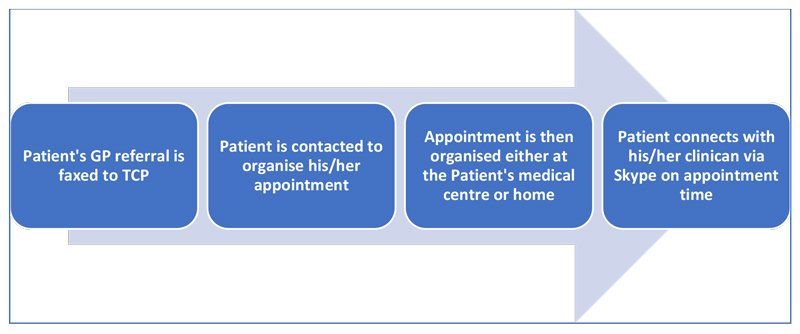Telehealth
Telehealth is the use of video conferencing through internet-based technologies such as Skype, to provide access to health care services for patients, who primarily reside in remote areas. For these residents, Medicare, provides rebates for a wide range of health care services, including psychology and psychiatry.
You can expect the equivalent standard of care for telehealth sessions, as you would expect in a face-to-face consult. The only difference is in a telehealth session you would be receiving your consult, through a computer, tablet or smartphone. Furthermore, if your psychiatry session is done at your medical centre, your GP (or another medical practitioner) attends the last 10 min for a handover process.
Recently, the Department of Health announced that telehealth services have been extended to the population that is affected the by the Coronavirus pandemic or are classified to be vulnerable, regardless of their location of residence.
Accessing psychiatric and psychology services through telehealth
To demonstrate how psychiatry and psychology services can be accessed through telehealth, the process of connecting patients with their clinician at Take Care Psychology (TCP) is illustrated below.

Legal framework
Telehealth consultations are bound by the same legal framework (e. g. informed consent and confidentiality laws) as seeing a psychiatrist face to face.
Effectiveness of telehealth vs face to face sessions
Many studies have shown that psychiatry telehealth sessions are just as effective as face-to-face session. In addition, they can be very convenient, because they cut down your travel time.
In the experience of TCP, in over 6 years of delivering psychiatry and psychology consultations through telehealth, only a handful of patients were not able to engage with their clinicians. The only limitation that TCP has experienced is that telehealth is not a suitable means for delivery of psychiatry services to children, as it is highly challenging to engage them remotely. As a result, the child and adolescent psychiatrist at TCP only accepts telehealth referrals for children, who are older than 12.
Requirements of telehealth
The requirements for a successful consult are as follows:
• A quiet, private room
• A fast, reliable internet connection
• A computer, tablet or smartphone (your psychiatrist will tell you which devices will work with their software)
As described below, there are two groups of patients that are eligible for receiving consultations through telehealth: (a) Patients who live in remote geographical areas and (b) patients living in any area but affected by the Coronavirus pandemic, spread rapidly in many countries.
Eligibility criteria for receiving consultations through telehealth
a) Patients living in regional area
The criteria to use Medicare supported telehealth services in Australia are (1) the patient and the specialist are required to be located a minimum of 15 kms apart at the time of the consultation and (2) patient’s place of residence is required to be in a geographically area that is eligible for receiving telehealth. The geographically eligibility is based on Remoteness Area (ASGC-RA) classifications. Telehealth Eligible Areas are those areas that are outside a Major City (RA1) according to ASGC-RA (RA2-5).
The exceptions to the eligible areas are where a patient is
• living in an eligible residential aged care facility; or
• be at an eligible Aboriginal Medical Service (AMS); or
• be at an eligible Aboriginal Community Controlled Health Service (ACCHS).
To see determine whether you live in a geographical eligible area, you need to use the map locator is provided on the Australian Government’s Doctor Connect website, http://www.doctorconnect.gov.au/.
b) The new Australian Government initiative for vulnerable & isolated patients
With the recent Coronavirus (also known as COVID-19) pandemic, the Department of Health has announced a new initiative, where people who are suffering from COVID-19, are isolated, or those that are considered to be vulnerable to this condition, can access to range of medical and allied health services through telehealth (e. g. Skype, FaceTime).
Vulnerable/isolated patients include are those where at least one of the following apply:
• people isolating themselves at home on the advice of a medical practitioner, in accordance with home isolation guidance issued by the AHPPC, and people who meet the current national triage protocol criteria for suspected COVID-19 infection after consultation with either the national COVID-19 hotline, state COVID-19 hotlines, registered medical or nursing practitioner or COVID-19 trained health clinic triage staff
• People aged over 70
• Aboriginal and Torres Strait Islander people aged over 50
• People with chronic health conditions or who are immunocompromised
• Parents with new babies and people who are pregnant.
You need to discuss your eligibility for any of the listed categories with your GP.
If you have any queries on receiving telehealth services, whether you live in a remote area or you may be eligible under the initiative for vulnerable & isolated patients, feel free to call the friendly admin staff at Takes Care Specialist Centre.

